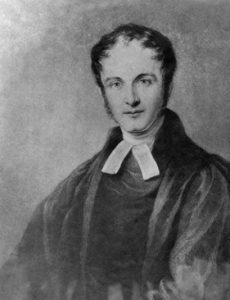


Henry Francis Lyte
Repertoire:
Abide With Me
Henry’s song, Abide With Me, expresses what a comfort it is to be a Child of God, cared for by the One who is always near and unchanging.
Lyte was born at Kelso, Scotland, June 1, 1793. His father, Thomas Lyte, was a Captain in the Army and not involved with his children. No information is known concerning his mother or his siblings. His early education was at Portora, the Royal School of Enniskillen, Ireland. He graduated from Trinity College, Dublin, in 1814. During his University time, he distinguished himself by winning the English prize on three occasions. The most important change in his life took place here. He had intended to study Medicine but for some reason, he changed to Theology. Upon graduation in 1815, his first church assignment was near Wexford, on the southeast coast of Ireland. In 1817, he was moved to Marazion, near Land’s End in Cornwall, the farthest west point of England.
He later noted that he had followed up his studies with idleness and frivolity. He felt no urgency with his studies and no calling on his life. Lyte speaks of himself as having been worldly-minded, and a stranger to experiential religion. But in 1818, in the providence of God, this all came to an end. A neighboring clergyman, one of his closest friends, became sick and was dying. Lyte began sitting with him and reading the Bible to him. At one point, his friend told Lyte that he was falling into darkness because he was “unpardoned and unprepared to die.” He had no hope in God. Lyte, equally ignorant of the grace of God, set himself to lead the dying man into the assurance he needed. Lyte describes this in a letter sent to one of his close associates, so we will let his words tell the story.
“I must now tell you by what circumstances I have been brought to this place, and into this new connection. When I last corresponded with you, I was, I think, returned to my friend from my dreary curacy of Taghinon in Ireland. Here I lived for some time, comfortably enough, assisting him in taking care of his two sons, riding about, shooting, dancing, and attending my curacy every Sunday. From this motley round of occupations, I was, however, withdrawn, by a circumstance which led the way to all my future wanderings. My friend, a neighboring clergyman, with whom I was intimate, and who bore the highest character for benevolence, piety, and good sense, was taken ill, and sent for me. I went to attend him, and witnessed all the workings of his mind and body for some weeks till he expired. I shall never forget some of the circumstances that took place: his serious and anxious inquiries into the evidence on which a future state existed, his examination into the grounds on which the Scripture stood as an authentic revelation, and his convictions that it was a just statement of that which is, and is to be, all seemed to pass before him, as he stood just on the confines of eternity, as strong and distinct realities, as the parts of a picture, rather than of an abstract speculation. These preliminaries settled, his inquiry next was, the means by which a happy eternity was to be attained—and here indeed my blood almost curdled, to hear the dying man declare and prove, with irrefutable clearness, that both he and I had been utterly mistaken in the means we had adopted for ourselves, and recommended to others, if the explanatory Epistles of St. Paul were to be taken in their plain and literal sense. You can hardly perhaps conceive the effect of all this, proceeding from such a man, in such a situation. He died, I rejoice to say, happy under the belief, that though he had deeply erred, there was ONE whose death and sufferings would atone for his delinquencies, and be accepted for all that he had incurred. I was greatly affected by the whole matter, and brought to look at life and its issue with a different eye than before; and I began to study my Bible, and preach in another manner than I had previously done.” Almost immediately, his family and close associates noticed a new sense of urgency in his sermons.
During his ministry, Lyte made two more moves. In 1819, he moved to Charleton, which is on the southeast side of London. In 1823 he was appointed Perpetual Curate of Lower Brixham, Devon, which moved him back to the area he loved, along the ocean’s edge. He held that appointment until his death, November 20, 1847.
Lower Brixham was an active fishing village and a harbor for many Royal Navy ships. Immediately, Lyte became an active part of the community. He joined the schools committee and quickly became its chairman. Lyte also established the first Sunday School in the area and created a Sailors’ Sunday School. Although religious instruction was given there, the primary object of both was educating children, fishermen, and seamen for whom other schooling was virtually impossible. All of this activity attracted such large crowds that the church had to be enlarged several times. But in all this, Lyte never forgot his local community. He visited them at their homes and on board their ships in harbor as they prepared for a time at sea. He began supplying every boat with a Bible along with a manual of songs and devotions for use at sea. He frequently was up and busy by 6 A.M. He read and prayed for two or more hours before breakfast as the ships prepared to sail.
But all this began to take a toll on his body. He had previously been diagnosed with asthma and now developed tuberculosis. The doctor suggested he move to a warmer, dryer climate. He would not consider a permanent move that would separate him from his church and ministry. He did travel to Italy several times and this helped for a while. But even that was a difficult time for him for it meant separation from his wife and family and his church. The tuberculosis began to take a toll on his body, and he planned a longer recuperative trip. Before he left, he wanted to preach once more to his people. His wife and family were concerned that all this would be too much. His daughter later noted that he felt an urgency to preach to his congregation before he left. This he did and then left England for Rome, Italy, for a warmer climate. Lyte never made it to his destination and died at Nice, France. Those around him noted that his last words were “Peace! Joy!”
Lyte wrote many poems with the greatest number based upon thoughts that were developed as he read God’s Word. Many were used for hymns but not many of his hymns remain in use today. A wonderful exception is our subject, “Abide With Me.” It is a request to the Lord, asking Him to keep His promise to be with us always. There is some evidence that he may have actually written it, or at least started it, in 1820 following the death of his minister friend. But the date usually given is 1847, when he perhaps completed it as a farewell before leaving his church in Lower Brixham. The hymn was published later that year in a leaflet with the author’s own tune, and was then published in a book, Lyte’s Remains, in 1850. This work was compiled and published by his daughter.
The tune (Eventide or Monk) which is almost universally used today with the hymn was composed for Lyte’s text by William Henry Monk, who was born at London, England, on March 16, 1823. Starting at age eighteen, Monk served as music director at various London churches and was editor of the Parish Choir from 1840 to 1851. In 1847 he became choir director at King’s College in London and, two years later, organist. In 1852, he became music director at St. Matthias Church in Stoke Newington, a position which he held until his death. During that same period Monk was also professor of music at King’s College, the School for the Indigent Blind, the National Training School for Music, and Bedford College. In 1882, Durham University, in recognition of all his work, awarded him the Doctor of Music Degree. Monk died at London on March 1, 1889.
As Christians, we know the abiding presence of the Lord, in this life and the next, is an assurance given to every believer. But sometimes, when it seems that all is falling apart and our way becomes rough and waves threaten our boat, we look to The Lord for some calm assurances that indeed, He is there. Perhaps those types of thoughts were in Lyte’s mind and prayers as he lived from day to day as his strength began to fail. There are times that perhaps we are so caught up in the journey, we fail to recognize that God is there with us and we can make the same request. Whether is it the close of our life or a time of suffering or persecution, Paul reminds us in Hebrews that He will never leave us or forsake us.
There are two additional verses that are always omitted, but need to be known.
“Not a brief glance I beg, a passing word;
But as Thou dwell’st with Thy disciples, Lord,
Familiar, condescending, patient, free.
Come not to sojourn, but abide with me.”
And the last, looking towards the future we all face:
“Thou on my head in early youth didst smile;
And, though rebellious and perverse meanwhile,
Thou hast not left me, oft as I left Thee,
On to the close, O Lord, abide with me.”
Merriam Webster defines ‘sojourn’ in its noun form as a short, temporary stay in a place that is different from your usual place of being. The word can also be used as a verb to describe the act of staying somewhere as a temporary resident or a short period. As Christians, we should make certain that we make room for Jesus to abide, to sojourn, and endure without yielding. Lyte may have whispered “Peace, Joy” as he breathed his last on earth but what a shout of victory he wrote: “On to the close, O Lord, abide with me.”
Source:
A Dictionary of Hymnology, John Julian, D.D., 1907, Dover Publications, Inc., New York
A Treasure of Hymns, Amos R. Wells, 1914, United Society of Christian Endeavor
Hymn Writers and Their Hymns, The Reverend S. W. Christophers, Anson D. F. Randolph & Co., Second Edition
Illustrated History of Hymns and Their Authors, Edwin M. Long, 1875, Joseph F. Jaggers, Publisher
Remains of the Late Rev. Henry Francis Lyte: With a Prefatory Memoir by the Editor, F. & J. Rivington, 1859, London
The Gospel In Hymns, Albert E. Bailey, Charles Scribner’s Sons, 1950,
The Hymns And Hymn Writers of the Church Hymnary, John Brownlie, D.D., 1911, Oxford University Press
